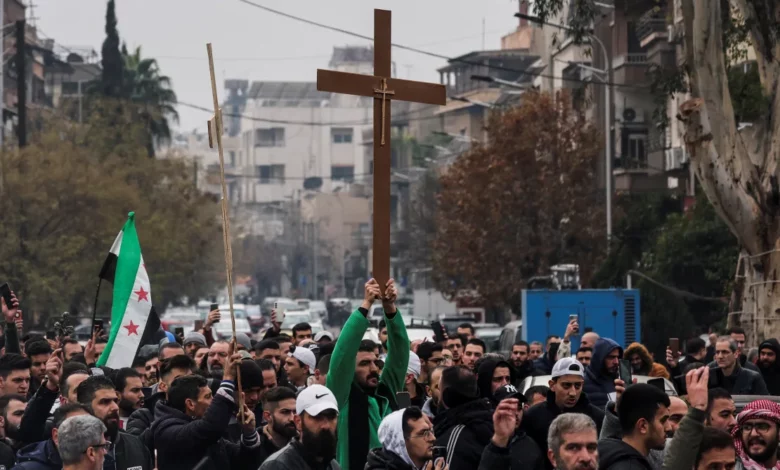Christians protest in Syrian after burning of Christmas tree


Protests erupted in Christian neighborhoods of the Syrian capital Damascus after a Christmas tree was set on fire in another town by unidentified men on Monday evening.
A video showing men setting fire to a publicly displayed Christmas tree in the Christian-majority town of Suqaylabiyah, near the city of Hama, emerged online, prompting the protests. It’s unclear who set the tree on fire but a video surfaced of a rebel standing next to Christian priests vowing to punish the perpetrators.
“Next morning you will see the tree completely restored,” the unidentified rebel told a protesting group next to the burnt Christmas tree.
The incident came three weeks since opposition rebels led a successful campaign to topple President Bashar al-Assad. Syria’s Christians now join those in Lebanon and Palestinian territories celebrating Christmas amid great uncertainty and fear in the region.
The protesters in the capital marched towards churches to demand better protection for Christians in the country, George, a 24-year-old Catholic resident of Damascus, who chose to give only his first name to speak freely, told CNN.
When Islamist rebels swept through Syria’s second largest city in an operation that would eventually culminate in the ouster of the brutal Assad regime, Christians were given assurances that their churches and property would remain protected.
Under Assad, Christians were allowed to celebrate their holidays and practice their rituals but like all Syrians faced tyrannical limitations on freedom of speech and political activity.
In control of most of Syria now is the Islamist armed rebel group Hayat Tahrir Al-Sham, led by Ahmad al-Sharaa, formerly known as Abu Mohammed Al Jolani – a man who had established al Qaeda’s affiliate in Syria before rebranding his group in 2016.
Al-Sharaa has maintained that his group will protect minorities and religious sects of Syria but has yet to call specifically for the protection for Christians ahead of the Christmas celebrations. The HTS-led government said that Wednesday (December 25) and Thursday (December 26) will be a public holiday.
Residents of the Syrian capital Damascus tell CNN that HTS has not imposed any limitations on celebrations or prayers this year, but Christians still fear that non-HTS rogue armed elements could attack them.
“Hayat Tahrir Al Sham have not announced anything on stopping our celebrations… but there are Christians who don’t want to go out to celebrate because they fear that they might get attacked from rogue armed individuals,” George said.
Christmas trees and other festive decorations are up across Christian neighborhoods of Damascus, George said, but people are scaling back their celebrations and imposing their own restrictions amid an absence of communication from HTS.
“It will make a big difference if there are announcements on better security for Christmas. Until now there isn’t proper security that is 100% organized,” George added.
Hilda Haskour, a 50-year-old Aleppo resident who identifies as Syriac Catholic, is preparing to celebrate Christmas but says there’s still worry among Christians.
“We just want to live in peace and safety, we are not asking for much…there is fear, people are tired,” Haskour said.




